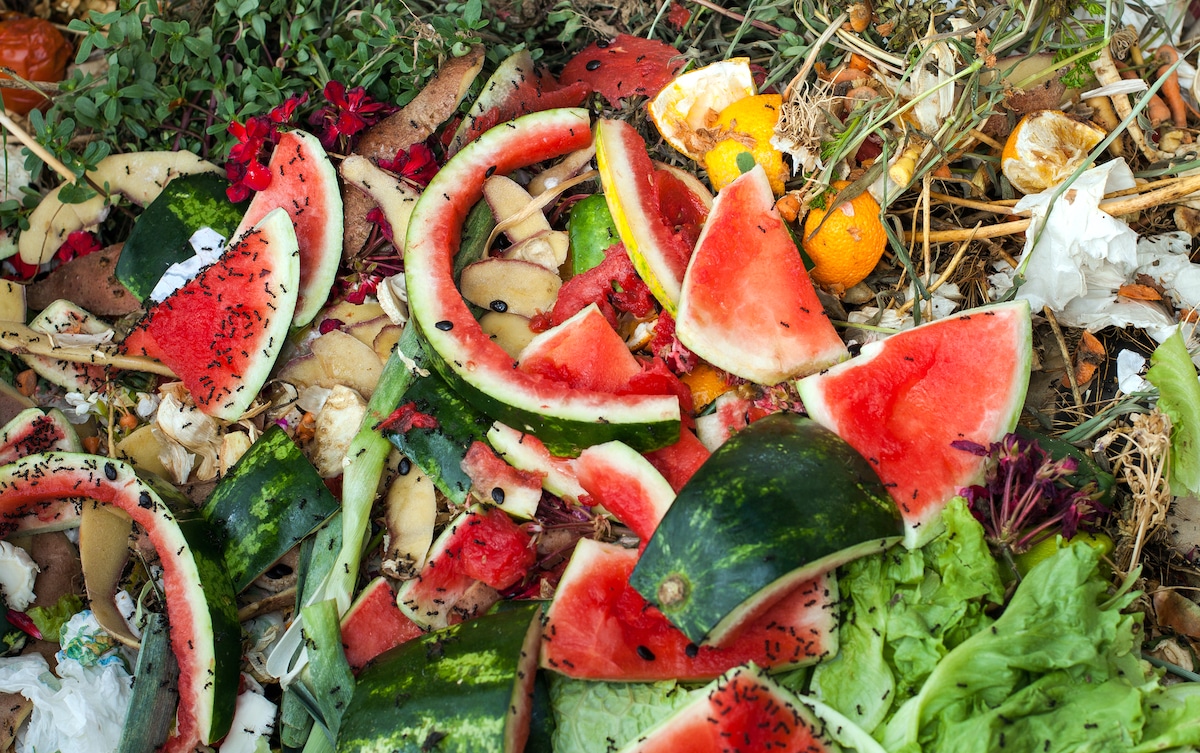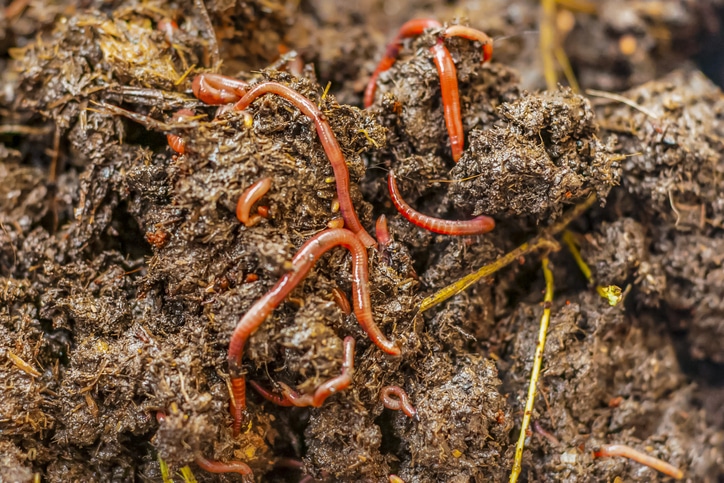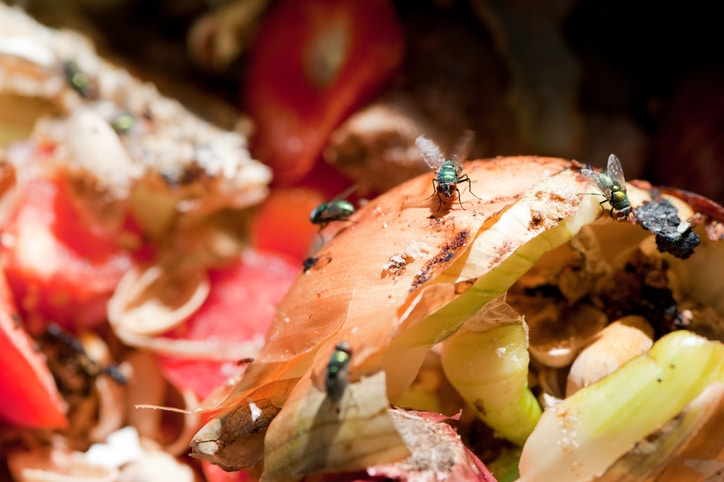Compost Bugs: The Good and the Bad

 Why you can trust us
Why you can trust us
Founded in 2005 as an Ohio-based environmental newspaper, EcoWatch is a digital platform dedicated to publishing quality, science-based content on environmental issues, causes, and solutions.
Do you ever peer into the compost bin after taking out your kitchen scraps? What do you see (besides your food waste creating rich, beautiful, natural fertilizer)? There are probably a lot of happy creepy-crawlers at work breaking down that green and brown matter, which is exactly what you want to see. But, there might also be some pets that find their way into the bin when they shouldn’t. Here’s which bugs you should welcome into the composter and which you should keep out.
The Good Bugs
Red Worms
If your compost pit is on the ground, you might already see some worms crawling around in it. Among other benefits, when worms tunnel around, they let air and water circulate better through the compost. They also produce worm castings (or vermicast), which is basically just a fancy way of saying worm poop, but it’s the one of the most nutrient-dense, richest natural fertilizers we know of. The casts are actually richer in nitrogen, bacteria, and organic matter than the material that the worm initially ingested. Some gardeners will raise worm farms and mix the castings with finished compost for fertilizer, but you can also put them directly inside your compost bin. They’ll reproduce right inside the bin, too. Just eight mature worms can result in 1,500 offspring within six months, so your supply will replenish itself many times over.

When it comes to compost, however, not all worms are created equal. Red worms (or “red wigglers”) are what you want, and they’re available online and in most plant or garden centers. This type of worm is tolerant of a wide range of temperatures, and feeds happily on kitchen and garden waste. Unfortunately, you probably won’t be able to find them in your own backyard. Regular earthworms (which include nightcrawlers: those ones that feed in the soil and come to the surface at night, or after rain) won’t be able to handle the hot temperatures of a healthy compost bin, and get their nutrients from soil rather than food scraps. They’ll just wiggle their way to the bottom of the bin and try to find a way out, or they’ll die inside.
Soldier Flies
They might look the same as houseflies at first glance, but soldier flies have a different purpose around the compost pile. Like houseflies, they like to lay their eggs on rotting food waste and their larvae look a little like maggots, but their bodies are segmented and grey-ish, turning brown as they age. Soldier flies pretty much exclusively dwell around mulch, manure, and compost piles, feeding on high-nitrogen scraps. Unlike houseflies, they don’t have a ton of interest in coming into your house, but if they start flying in through doors and windows, move the compost bin further from points of entry. While they’re great at breaking down organic material, they might compete with worms for food, so maintaining a healthy balance is advisable.
Isopods
The isopod order includes pill bugs and woodlice (or sowbugs), which look like little armadillos. You might recognize the pill bug, more colloquially known as a rollie pollie. They’re the only crustacean that has adapted to live its entire life on land, and love to feast on decaying matter. They are a friendly face in a compost heap!
Slugs
Slugs are generally not a welcome sight in the garden, but they’re a happy one in the compost bin. Slugs break down organic matter, so they’re beneficial in the decomposition process. If you’re noticing a ton of them though, it might be a sign that the compost is too wet. Don’t worry about them infesting your crops; the slugs will very likely die of old age by the time the compost is ready to be spread in the garden, and their eggs will probably be eaten by other critters or decompose as well. So, if you notice slugs in the garden preying on your veggies, toss them in the compost bin, where they’ll do some good.
The Bad Bugs
While an isolated “bad” bug isn’t usually cause for concern, infestations of certain critters can have consequences for your compost. Some pests might also frequent the pile for a meal, and some might be attracted to the smell. Even though a swarm of fruit flies or houseflies isn’t so detrimental to the compost, it might be annoying to people who live nearby.
Ants
Ants like to find dry soil to build their nests — so, if you’re seeing ants in the pile, it’s probably a sign that your compost is too dry. Compost should have the water content of a wrung-out sponge: pretty damp, but not soaking wet. Consider adding some water to the pile if it’s gone dry, and make sure you’re turning it frequently.
Ants do have some benefits: they aerate the soil and bring in other beneficial microorganisms that increase the biodiversity of the pile. They do, however, compete with worms (arguably the most desirable composting insect), and they like to carry away their food, which could ultimately detract from the health of the pile. Fire ants will attack worms directly, so a fire ant sighting does warrant some action.
Houseflies
Houseflies aren’t necessarily a problem in and of themselves, but they can be a nuisance, and their larvae are unsightly in the pile. If houseflies are swarming the compost and your yard, the pile is probably either too wet, or the balance of nitrogen-rich “green” matter (kitchen waste, grass clippings, etc) and carbon-rich “brown” matter (drier, woodier materials like leaves and garden debris) isn’t quite right. Cover the compost during rainy weeks if it’s too wet, or add more dry brown material to the pile. If you have an exposed pile, don’t just dump scraps and leave it; turning the new matter under will deter flies.

Spiders
Spiders too aren’t necessarily a problem for the decomposition process. They’re drawn to the pile for what’s inside: all those good flies and creepy-crawlers. They’ll prey on the good bugs while not doing much to actually help break down the scraps.
Millipedes and Centipedes
Like ants, these many-legged bugs also appear in dry piles. They do feed on decaying plant matter, so technically they do help with the decomposition process. However, they also prey on other beneficial insects in the pile, like slugs, worms, and larvae, which eventually negates any benefit they might have. Centipedes also deliver a painful bite, which can be a nuisance when dealing with your compost bin.
Cockroaches
Cockroaches are actually a beneficial composting insect — they are recyclers, helping break down matter into rich compost — but, they are off-putting, and a rather unnerving sight when they make their way into your home. Especially in the winter, cockroaches are drawn to warm compost bins. A cockroach inside the bin isn’t cause for concern regarding the actual compost, but more for its presence around your home. If you notice a roach, make sure the bin is a good distance from your house. They love the smell of rotting food, so a well-balanced pile free of meat, grease, and dairy won’t be as attractive to them.
Small Mammals
Compost is attractive to more than just bugs! Mice, rats, possums, and racoons might be drawn to compost to search for their next meal — especially compost pits or three-bin compost systems that sit directly on the ground and are more accessible to tiny paws.
To keep small mammals out, turn the pile more frequently, or bury food scraps deep within brown matter. Raccoons are the only ones that might keep digging to find what they smell, which is another good reason to keep meat scraps out of the compost. Rodent-resistant bins are an option for keeping out smaller critters, and enclosing a plastic bin in wire mesh will hopefully keep the raccoons out, too. They are adept at opening all kinds of doors and latches, but keeping a weighted lid or something heavy on top of the bin’s door will make it harder for them to access what’s inside.
How to Deter Bad Bugs
The most effective way to keep pesky or harmful bugs out of the compost is to maintain a healthy pile. Meat and dairy will attract more pests, and isn’t healthy for compost anyway. There should be a good distribution of carbon to nitrogen as well: preferably a 20:1 ratio. This will also help with the odor that’s so enticing to mammals and flies. The pile should be turned frequently for aeration, and the moisture level consistently damp (but not soggy). If flies are a problem, cover up fresh food waste with dirt or bury it deep within the pile. It’s easier for bugs to break down compost matter if it’s been shredded or otherwise broken up by hand, so you might consider breaking big things — like corn cobs, whole fruits, and thick peels — down a bit before adding them to the bin.
If you have a major pest problem, pour some boiling water into the bin, which will kill the bugs on impact. However, this will also kill many of the good insects, so this should be a last resort.
When the pile reaches final stages of decomposition, you might notice that there are fewer (or no) bugs left in the pile, which isn’t cause for concern. The pile might become too hot to foster bug life at later stages, and once the scraps have fully decomposed into beautiful black gold, it’s no longer attractive to critters looking for food. They’ve finished their work!
Subscribe to get exclusive updates in our daily newsletter!
By signing up, you agree to the Terms of Use and Privacy Policy & to receive electronic communications from EcoWatch Media Group, which may include marketing promotions, advertisements and sponsored content.

 233k
233k  41k
41k  Subscribe
Subscribe 




